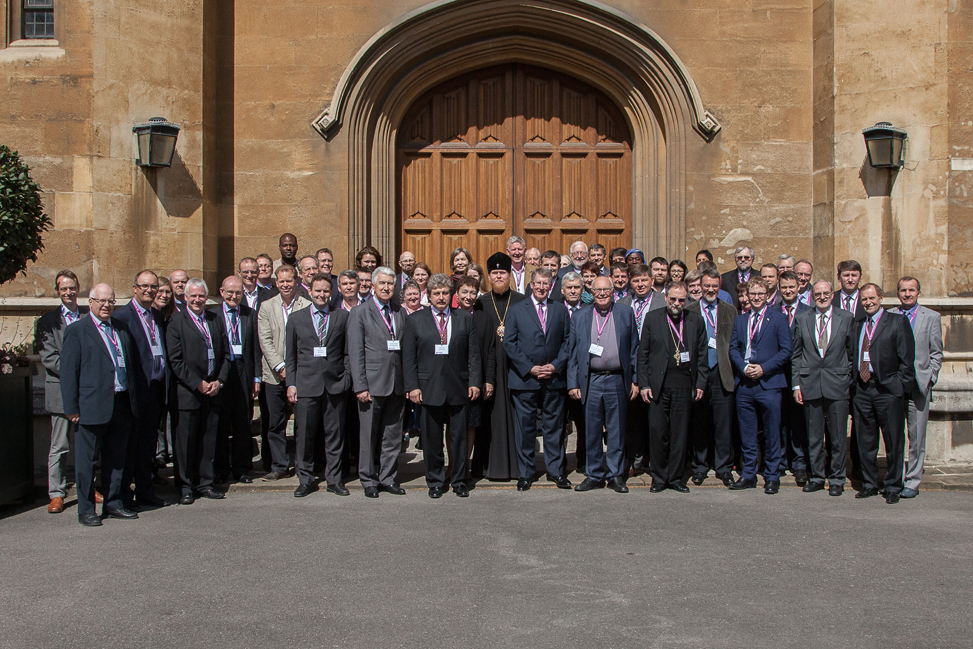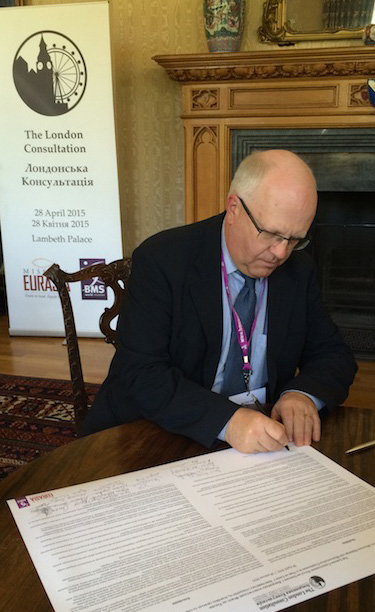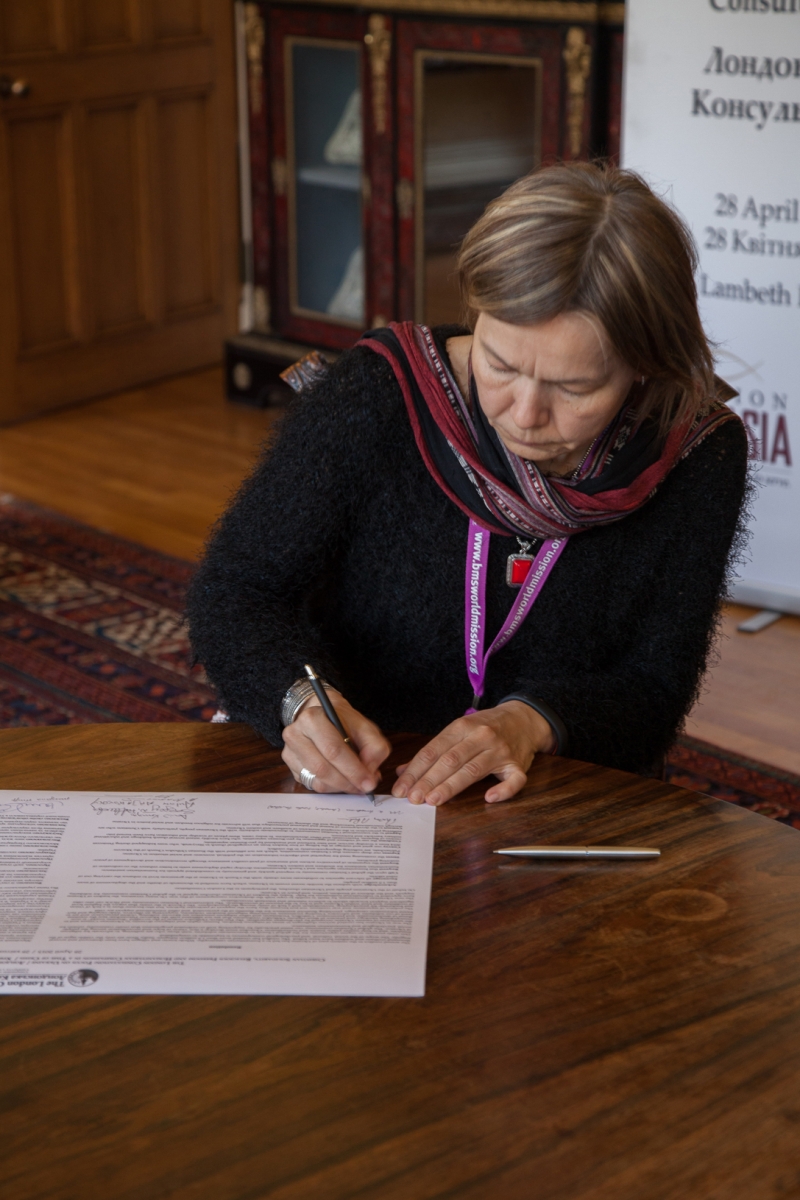The London Consultation: standing in solidarity with Ukraine
The London Consultation: standing in solidarity with Ukraine
 More than 6,000 people killed and 1.2 million internally displaced in the last year – how should the global Church respond to the Ukrainian conflict? Around 60 delegates and observers grappled with this question at the London Consultation, a special event organised by BMS and Mission Eurasia on Tuesday (28 April 2015) at Lambeth Palace.
More than 6,000 people killed and 1.2 million internally displaced in the last year – how should the global Church respond to the Ukrainian conflict? Around 60 delegates and observers grappled with this question at the London Consultation, a special event organised by BMS and Mission Eurasia on Tuesday (28 April 2015) at Lambeth Palace.
Around a horseshoe of tables were delegates from Ukraine, Russia, the UK and across Europe from a variety of denominations, Christian organisations and humanitarian agencies. Surrounding the delegates were observers, including a number of Baptist ministers invited by BMS. The event was conducted in three languages: Ukrainian, Russian and English, with simultaneous translations available to delegates working across boundaries of nationality, church and culture.
 Over four sessions, speakers explored different aspects arising from the conflict: the concept of the ‘Russian worldview’ and how certain ideologies within it may be driving the current crisis in Ukraine, how Christians should react to Ukraine's humanitarian needs, threats to religious freedom and human rights and developing a reconciliation process. The day also included a session of spirited open discussion.
Over four sessions, speakers explored different aspects arising from the conflict: the concept of the ‘Russian worldview’ and how certain ideologies within it may be driving the current crisis in Ukraine, how Christians should react to Ukraine's humanitarian needs, threats to religious freedom and human rights and developing a reconciliation process. The day also included a session of spirited open discussion.
At the close of the Consultation, a resolution was signed by delegates. The resolution calls on the global Christian community and humanitarian agencies to acknowledge what is happening in Ukraine, and to develop a practical response to support the Ukrainian people.
 At the signing, BMS Global Ambassador Rev Dr David Coffey (above, centre) joined hands with Rev Yuri Sipko (left), former President of the Union of Evangelical Christians-Baptists of Russia and Bishop Mykhailo Panochko (right), President of the Evangelical Faith of Ukraine, and each prayed in their own language. The symbolism of them joining together in prayer for Ukraine was an abiding image from a conference that hopefully bear fruit of solidarity, justice and reconciliation.
At the signing, BMS Global Ambassador Rev Dr David Coffey (above, centre) joined hands with Rev Yuri Sipko (left), former President of the Union of Evangelical Christians-Baptists of Russia and Bishop Mykhailo Panochko (right), President of the Evangelical Faith of Ukraine, and each prayed in their own language. The symbolism of them joining together in prayer for Ukraine was an abiding image from a conference that hopefully bear fruit of solidarity, justice and reconciliation.
Pray that the London Consultation will lead to a renewed effort by the global Christian community to support the people in Ukraine practically and spiritually.
For a further report on the Consulation read: The West must wake up to the threat of Russia by Lucinda Borkett-Jones on the Christian Today website.
This news (text and photos) first appeared on the BMS World Mission website and is used with permission.
• • •
Tony Peck, EBF General Secretary comments: "This Conference was a very positive experience that nevertheless highlighted the continuing difficult and challenging conflict situation in Ukraine, especially in the Donbass. My own contribution was to speak of preparing even now for the possibility and hope of reconciliation, especially between the churches of Ukraine and Russia. That will continue to be a priority for the EBF as it relates to its member Unions in the two countries."
Full text of the London Consultation Resolution signed at the and of the Consultation.
Christian solidarity, religious freedom and humanitarian compassion in a time of crisis
28 April 2015
Resolution
The armed conflict in the eastern part of Ukraine has led to a humanitarian catastrophe. Whole towns and villages have been destroyed and several thousand civilians and soldiers have been killed. The conflict has created more than 1.5 million refugees. Sadly, these are only the visible signs of the tragedy. The scope of the social, cultural, and psychological consequences is impossible to comprehend.
 This crisis presents an urgent opportunity for the global Church to demonstrate solidarity with those who are suffering, to advocate for religious freedom, and to help restore peace, justice and reconciliation. Churches must develop a new vision of hope and reconciliation among the people of Ukraine. The global Christian community can assist practically by supporting well co-ordinated programmes that create community centres for social, psychological and humanitarian assistance.
This crisis presents an urgent opportunity for the global Church to demonstrate solidarity with those who are suffering, to advocate for religious freedom, and to help restore peace, justice and reconciliation. Churches must develop a new vision of hope and reconciliation among the people of Ukraine. The global Christian community can assist practically by supporting well co-ordinated programmes that create community centres for social, psychological and humanitarian assistance.
The war in Ukraine has created serious challenges in areas of religious freedom, human rights and religious diversity in Ukrainian Crimea and in the territories of eastern Ukraine occupied by pro-Russian separatists. The Pan-Slavic Orthodox notion of the so-called “Russian world” is now monopolising ideology and practice in these regions. Orthodox confessions that are not affiliated with the Moscow Patriarchate face the constant threat of discrimination and persecution. Catholics, Protestants and other religious minorities are likewise suffering violent persecution and are in need of our solidarity and advocacy. Creating awareness, monitoring religious freedom violations, supporting an effective, wide-ranging and fact-based information campaign, providing financial assistance for the families of the persecuted, and other international support are vital.
The politics of separatism and war continue, not just because they have the support of particular factions, but also because there is a lack of vision and leadership for peacekeeping, reconciliation and a lack of unity among the peacekeepers. The Church is the entity that enjoys the highest level of credibility and trust within Ukraine and is key to the process of reconciliation. The international Christian community and NGOs can also offer significant support towards efforts to achieve national and interfaith reconciliation.
 The new Ukrainian government, by itself, is unable to cope with the destructive consequences of this war. On many occasions, the leaders of Ukraine have appealed to international institutions for help. Today the leaders of Ukrainian churches appeal to the global Christian community for solidarity, support, and the defence of freedom, justice, and peace in Ukraine.
The new Ukrainian government, by itself, is unable to cope with the destructive consequences of this war. On many occasions, the leaders of Ukraine have appealed to international institutions for help. Today the leaders of Ukrainian churches appeal to the global Christian community for solidarity, support, and the defence of freedom, justice, and peace in Ukraine.
On behalf of the Ukrainian people and Ukrainian churches, the participants in the London Consultation:
Acknowledge with sadness the terrible recent events in Ukraine, which have resulted in thousands of deaths and the displacement of more than 1.5 million people;
Encourage all relevant agencies to collaborate more closely with the Church in Ukraine at the grassroots level to enhance the carrying out of relief efforts;
Call upon the global Christian community to respond quickly and generously to consolidated appeals for humanitarian assistance;
Request that humanitarian agencies and Church denominations develop rapid deployment units to better enhance the co-ordination of humanitarian assistance for southern and eastern Ukraine;
Request the expansion of preventive actions and assurance of post-conflict assistance through reconstruction and development of peace-restoring practices;
Stress the continuing need for impartial and objective information on the political, economic and social situation in Ukraine;
Express our deep concern that Christian communities, which are not affiliated with the Russian Orthodox Church of the Moscow Patriarchate, are suffering disproportionately in the conflict;
Convey our grief and outrage at the killing of four leaders from an evangelical church in Slavyansk, who were kidnapped during Pentecost 2014 from a worship service, and later tortured and murdered by pro-Russian separatists;
Condemn the use of violence and aggression by pro-Russian separatists, who have forcibly seized several church buildings and educational centres of Baptists, Pentecostals and other denominations. In many cases, these places of worship and education have been turned into military barracks and fortresses;
Appeal to the international Christian community to demonstrate solidarity with the Ukrainian people, particularly with Christians who are suffering persecution in the occupied territories of southern and eastern Ukraine;
Commit to the development of formal and informal partnerships that will advocate for religious freedom and social justice in Ukraine through international networking and the sharing of resources.
Photos: EBF leaders signing the Consultation Resolution. EBF